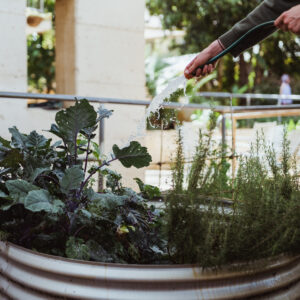Get more information.
Take a tour of our school and see Montessori education in action, or get in touch with our friendly team for more information.
This website may not work correctly in Internet Explorer. We recommend switching to a more secure modern web browser such as Microsoft Edge which is already installed on your computer.
The holistic plan underlines the interdependency of everything that surrounds us instead of breaking learning up into small disciplines, and it is an approach that supports the moral, social and personal development of each student.
The focus for adolescent students is on the development of the personality, on moral and social development and their preparation for participation in society as future adults, both through theoretical knowledge and practical experience.

Montessori based her educational philosophy on the idea that children develop through a series of four planes. At this age (12-15), children enter the third plane of development, which is a period when they desire social and financial independence while trying to find their place within society.
As children transition to adolescence, we address their changing developmental needs and prepare them for adulthood and the real world by developing theoretical knowledge and putting it into practice.
We believe that by supporting the adolescents in their task to become adults through immersion in meaningful learning, they gain the skills needed to become self-motivated and invested learners.
Through adult-level interaction and purposeful problem-solving work, we encourage individuality and support each child in developing their personality, all within the context of a social organisation.
While projects may focus on specific disciplines, all work incorporates language, writing and mathematical skills, as well as practical components, with progress monitored by subject teachers and the advisory teacher.
At this time, the studies ought to be directed toward humanity, toward human life… the feeling of society, which ought to contribute to more understanding among [people], and as a result, more love.”
Montessori recognised the need for the adolescent to become economically independent. The Montessori adolescent syllabus prescribes that students should be actively involved in the production and exchange of goods and services – the result is the microeconomy program. At our school, we take our microeconomy program very seriously as we strongly believe that it gives our students meaningful learning opportunities and engages them in their own learning.
At our school, our microeconomy program within our lower secondary class (Years 7-10) engages students to work in four different groups: Food, Farm, Factory, Fabrications, and Facilitators. Every student gets the chance to experience the five groups throughout the year and, as they progress through lower secondary, their involvement within the program evolves.
Within the microeconomy program, students have established a business: Honkey Nuts. Their best-known business endeavour is a waste-free café, which they manage and operate themselves. The students have maintained a waste-free ethos so all products such as coffee, sugar, tea, are purchased in refillable containers; they serve beverages in keep cups or fully compostable take away cups. In addition, they also produce amazing products, such as candles, soaps, and bath bombs – with the flagship products being lip balms and body butter.
A shop, or store, could be established…and here the students could easily sell and bring their produce of their fields and garden, and other things that they have made.”

We could talk about the benefits of this program, but we thought we’d let our students share their thoughts on the subject; after all, we are a student-led school!
I feel that micro economy is a good way to prepare students for the professional world ahead of them as well as a good fundraiser for the school.”
Microeconomy is a chance for students to practice a range of skills, like teamwork, self-management, etc. I think it’s a wonderful opportunity for students like me to learn and practice these attributes.”

The Montessori National Curriculum is approved by the Australian Curriculum, Assessment and Reporting Authority (ACARA).
The secondary academic curriculum covers:
During this period of development, children are refining their moral compass while developing a stronger sense of responsibility.
Over the years, our students have been heavily involved in the community, helping those in need and stepping outside their comfort zone to explore the world around them. Their community work has included sponsoring a child through the Sunshine Foundation, collecting backpacks and purchasing much-needed items to fill those backpacks for Youth Futures, and travelling to Thailand to immerse in a new culture. In addition, they donate 20% of Honkey Nuts’s profits to charities that support causes close to their hearts.
Our lower secondary multi-aged classroom houses up to 30 students, split into two groups: Lower Secondary 1 (Years 7 and 8) and Lower Secondary 2 (Years 9 and 10). We welcome students from different education paths, including international students. For families wishing to transfer their children from mainstream schools to our school, please note that we can offer trial days to ensure that we are the right fit for your child and for your family.
Above all it is the education of adolescent that is important because adolescence is the time when the child enters the state of [adult]hood and becomes a member of society.
Take a tour of our school and see Montessori education in action, or get in touch with our friendly team for more information.
